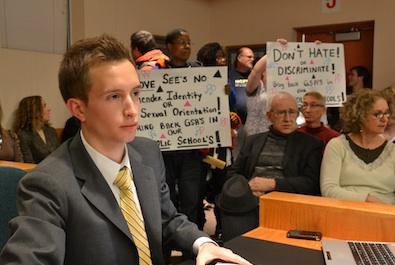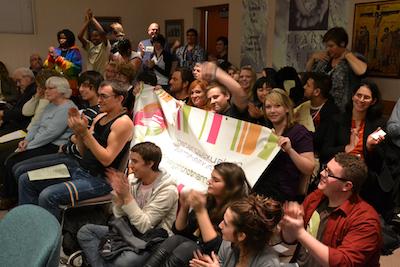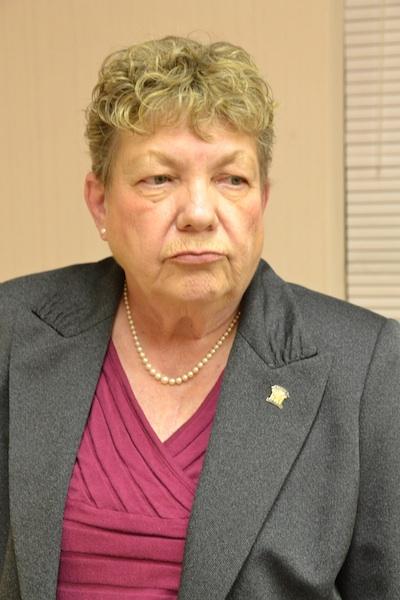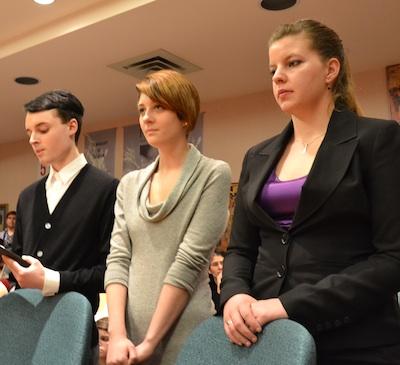
Gay Halton Catholic trustee Paul Marai. Credit: Photo Andrea Houston

Activists celebrate the vote that repealed the ban. Credit: Photo Andrea Houston

Board chair Alice Anne LeMay. Credit: Photo Andrea Houston
The Halton Catholic District School Board (HCDSB) struck down its controversial ban on gay-straight alliances (GSAs) Jan 18, but the board’s new equity policy may still discriminate against gays.
One battle has been won, but the fight is far from over, says former HCDSB student James Hopkins, 19, who bravely gave trustees in Burlington a picture of what it’s like to grow up gay in small-town Ontario. He says he plans to take the fight to Queen’s Park to pressure the Ministry of Education to push for one equity and inclusive education policy for all school boards.
“Day in, day out, I suffered,” he said in his address (video) to the trustees and the gallery full of students and activists. “What I, and so many other gay youth, experience is not an act of hatred, but one of fear. Without exposure [to gay people], how do we fight ignorance?”
Loud cheers echoed through the gallery at HCDSB offices as hundreds of students, activists, Halton community members and teachers celebrated the repeal of the ban.
In a 6-2 vote, trustees decided to rescind the ban and shelve their equity and inclusive education policy. While a new policy is drafted, the board will use the Catholic “template.” The template is a version of Ontario’s equity policy that’s written specifically for English Catholic boards by the Ontario Education Services Corporation.
Originally, Halton wasn’t satisfied with the Catholic template, so they made a few edits when they quietly passed the policy in November, such as removing the terms “sexual orientation” and “gender.” That’s also when they added the ban on GSAs.
When asked by Xtra whether the board will allow groups to be called gay-straight alliance clubs, board chair Alice Anne LeMay refused to answer the question.
“I can’t answer that tonight. The policy will go to senior administration and will be implemented in the schools,” she said.
The HCDSB came under fire after an Xtra story Jan 6 uncovered the board’s ban on GSAs. LeMay justified the ban by saying the schools “don’t have Nazi groups either. They are not within the teachings of the Catholic Church.”
Although the ban is now lifted, the HCDSB may follow other Catholic school boards in Ontario and adopt a broad “diversity group” policy, creating space for more general anti-discrimination clubs, which allow students to discuss a number of social justice issues, such as racism, sexism, poverty and homophobia.
But many students and activists say that’s not enough. Allowing students to call the groups what they are — “gay-straight alliances” — is crucial, Hopkins says.
“Having a broad group is a bad move,” says Sheridan College student Brian Best, who spoke at the meeting. He says it waters down the message. “This is a fight worth fighting for. No student’s rights should be violated.”
Despite calls for LeMay to step down as chair for her comments, the board reaffirmed her as chair in a unanimous vote. Gay trustee Paul Marai originally wanted to abstain, but LeMay wouldn’t allow him. She refuses to answer questions about whether she should resign as chair for her comments.
“I was disturbed [the board] wouldn’t take a position about whether they would allow gay-straight alliances in schools,” says Noa Mendelsohn Aviv, director of the equality program at the Canadian Civil Liberties Association (CCLA), who was at the meeting.
“The board is being deliberately vague. [Gay kids] are entitled to those groups. The operative question isn’t why should they have these groups, it’s why shouldn’t they be allowed to have them.”
Mendelsohn Aviv wonders what other schools in Ontario, Catholic or public, have anti-gay policies. The CCLA plans to get involved if students that want to start GSAs are blocked by school officials, she says.
“And being banned from using the use of the word ‘gay’ is extremely problematic,” she says.
Sarah Kelly, a master’s of teaching student at the Ontario Institute for Studies in Education (OISE), who started the Facebook page “Fight the Halton Catholic Board’s ban on Gay Straight Alliances,” led a group of students and activists in making emotional pleas to the board.
“The fact remains, one in three gay and lesbians will attempt suicide due to the damaging attitudes and policies such as this very ban,” she told the board.
Kelly says she plans to be vigilant to ensure the board’s new policy is in line with Ministry of Education directives and the students’ Canadian Charter rights. That’s why she is joining Queer Ontario’s Casey Oraa to return to the HCDSB to review the document during the policy’s consultation process.
“This board took the template policy and removed sexual orientation,” she says. “There should be one Ministry of Education-directed policy that all boards follow.”
Before the meeting, security guards drew people’s attention to a red sheet of paper outlining the “Rules of Conduct for Board Meetings.” Attendees were told to write any questions on a form, which would be read aloud by LeMay during the “Open Question Period.” LeMay read only two questions and answered neither.
Trustees remained in camera for more than an hour before the public was allowed in. Meanwhile, in the front foyer, people continued to pour in. Most were students. A couple wore rainbow sweaters and many carried signs and banners. Another group wore shirts that read “Straight. Not Narrow.” Those waiting in the lobby laughed at the surreal events in Halton over the past two weeks and shook their heads at the alarming rhetoric that has come from trustees.
In stark contrast to the jubilant and smiling students was Adriana Bassi, 75 and a mother of three, who scowled by the entrance to the boardroom. She said the ban should not have been lifted.
“[Students] should not be able to start a GSA,” she told Xtra prior to the vote. “Keep sex in the bedroom. Sex shouldn’t be an education matter.”
Bassi was one of about seven in a group of vocal pro-ban protesters sitting at the back. One held up a large sign that read “The HCDSB already fosters equity and inclusion. No need for GSA clubs.”
“Kids don’t go to school to learn about sex lives,” she said.
It wasn’t just students who came to protest the ban. Queer Ontario, the CCLA and Heterosexuals for Same-Sex Equality (HSSE) also attended.
When the doors finally opened to the public, the guards battled students who raced for one of the 95 available seats. Dozens were shut out.
“I’m only hearing intolerance from this board,” says Liz Morgan from HSSE. “If students that died from suicide had GSAs in their boards, perhaps they would still be with us.”
Applauding the board’s move to lift the ban was Chris Hurley, a former HCDSB student and current University of Toronto student who came to lend support. He says it’s very important that the clubs be called gay-straight alliances.
“In some cases these clubs can be a life-or-death issue,” he says. “I know I could have used a GSA when I was growing up. Embrace humanity over religion.”
But some trustees still aren’t convinced. Trustees Anthony Danko and Jane Michael voted against the motion. Danko, who ran away from Xtra’s microphone, says he collected the names of 128 people who support the ban from a local church.
Michael, the trustee who earlier told Xtra, “I don’t think sex clubs should be in school,” says she wasn’t affected by the heartfelt words of the students. Her position on GSAs stands.
“[The Catholic Church] takes exception to the homosexual lifestyle,” she says. “We help all students live a chaste life. We must create a policy that upholds the Catholic teachings.”
The ban and policy changes were made as a result of a letter sent by Bishop Paul-André Durocher, chair of the education commission of the Assembly of Catholic Bishops of Ontario. He wrote that gay-straight alliance clubs imply a self-identification with sexual orientation that is often “premature” among high school students.
Queer Ontario recently sent a scathing letter to HCDSB trustees slamming the board for its anti-gay policies. Oraa says the advocacy group plans to go to the Ministry of Education to find out how many GSAs are actually working in schools across Ontario.
“It’s clear it’s not just the Halton Catholic District School Board that patterns this way,” he says. “So we will now be approaching the ministry. We need to let boards know that they are on the hook for explicit language in the ministry’s equity policy.”
Also at the meeting was Richard Brock, the local president of the Halton Ontario English Catholic Teachers Association, who says recent events have focused attention on the issue of Catholic funding in Ontario.
“You’ve created a shit storm for Catholic education in this province,” Brock told Xtra.
Trevor Copp, artistic director of the Tottering Biped Theatre, a Halton community member who hame out to show support, says that if Catholic boards are unable to reconcile religious beliefs with Ministry of Education directives, their public funds should be cut off. Taxpayers should not be funding a school system that is discriminatory.
“The Halton board, and the Catholic system in general, is just a relic. It has no place in our current society; it has no space here anymore,” he says. “It’s a done deal. This, what has happened here in Halton this week, proves it is time we come to terms with that. We only need a public school system.”

 Why you can trust Xtra
Why you can trust Xtra


